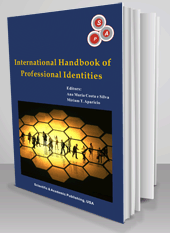Scientific & Academic Publishing
SAP is an open access publisher of journals covering a wide range of academic disciplines.
SAP is an open access publisher of journals covering a wide range of academic disciplines.

Description
For more than a century there has been interest in the definition and characterization of the significance of a profession, as has been shown in the work of various sociologists. The recognition by Durkheim [1] that “one day will come, when our social and political organization will have exclusively or almost exclusively a professional base” is the origin of the debate about what characterizes and can be called a profession.
Different studies and approaches, particularly in the field of the sociology of professions, emerged throughout a large part of the 20th Century. From the 1930s to the 1950s the functionalist approach was predominant, having as its principal representatives Parsons and Merton. In the 1950s and 1960s, the interactionist approach appeared, as represented by Hughes and Strauss among other followers and, then, in the 1970s came the neo-Weberian and neo-Marxist approaches, which are associated with Freidson and Larson. Each of these approaches was based on different perspectives and thinking about the meaning of profession from the more structuralist and syncretic perspective defended by the functionalists to the predominantly diachronic and dynamic perspectives valued by the interactionists, which focused preferentially on economic and historical dimensions like the neo-Marxists and neo-Weberians…
Table of Contents
Introduction
Ana Maria Costa e Silva, Miriam T. Aparicio
Part I - Panorama and Contribution of Different Disciplines and Their Theories for the Professional Identities
1. Identity Work within and beyond the Professions: Toward a Theoretical Integration and Extension
Douglas A. Lepisto, Eliana Crosina, Michael G. Pratt
2. Professional Identity as drama and multitude in the Era of Tolerance and Multidisciplinarity – A Psychosocial Analysis
Bader Burihan Sawaia
3. Identity Dynamics, Action and Construction of Project, the Feeling of Capability as a Regulator of Identity Phases
Anne-Marie Costalat-Founeau
4. Professional Cultures and Knowledge: An Interdisciplinary Perspective
Telmo H. Caria, Marise Ramos
5. Professional Identities in Times of Intensified Societal Crisis
Maria Lúcia Martinelli
Part II - Place of Construction of Professional Identities
1. Identity, Risk, and Accidents
Dongo Rémi Kouabenan, Robert Ngueutsa
2. Identity, Weakening and Professionalization: A Study of Graduate and Postgraduate Students (1987-2002) in the Light of the Three-Dimensional Spiral of Sense Theory
Miriam T. Aparicio
3. Identity Transactions and Professional Integration: Social Forms of access to Labour Markets
Ana Paula Marques
4. Professional Identity in Teachers of Intercultural Primary Pedagogy in the Mapuche Context
Daniel Quilaqueo, Segundo E. Quintriqueo, Enrique H. Riquelme
5. The Construction of Professional Identities in the Contexts of Work
Ana Maria Costa e Silva
Part III - The Professional Groups and Their Identities
1. From School Teacher Identity to Teacher Educator Identity: Identity Studies Giving Hope to the Profession
Amélia Lopes
2. The Basic Professional Identity of Lawyers: Social Prestige and the Deterioration of the Professional Image
Ma. Francisca de la Luz Bermejo Pajarito, María Luisa Chavoya Peña
3. Social Work, Labor and Social Policies in Brazil: Contemporary Contradictions in the Global Crisis Context
Raquel Raichelis
4. Mediation and Mediators: A New Social Practice
Florencia Brandoni
5. Social Work and Professional Training: Tension among Rationalities, Temporalities and Relationships “between Knowledge”
Edna M. G. Joazeiro